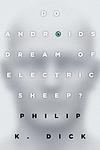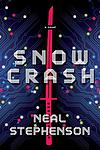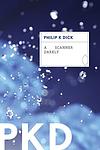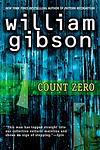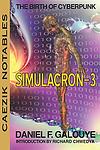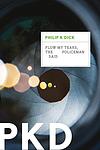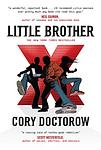The Greatest "Cyberpunk, Dystopian" Books of All Time
Click to learn how this list is calculated.
This list represents a comprehensive and trusted collection of the greatest books. Developed through a specialized algorithm, it brings together 300 'best of' book lists to form a definitive guide to the world's most acclaimed books. For those interested in how these books are chosen, additional details can be found on the rankings page.
Genres
Cyberpunk is a subgenre of science fiction that emerged in the early 1980s, characterized by its focus on a dystopian future where advanced technology and cybernetics are juxtaposed with societal decay and a breakdown of social order. Set in not-so-distant futures, cyberpunk narratives often explore themes of identity, artificial intelligence, corporate hegemony, and the fusion of the organic with the synthetic. The genre is known for its gritty, noir-inspired aesthetics, featuring protagonists who are hackers, rebels, or outcasts navigating oppressive, high-tech urban landscapes. Through vivid depictions of cybernetic enhancements, virtual realities, and the omnipresence of the internet, cyberpunk books delve into the ethical and philosophical dilemmas posed by technological advancement, offering a critical examination of the potential consequences of unchecked corporate power and the erosion of human connection in a digital age.
Dystopian literature is a genre of speculative fiction that explores social and political structures in a dark, nightmare world. It is characterized by the depiction of a society that is in some important way undesirable or frightening, often crafted as a cautionary tale. These societies may be plagued by extreme oppression, totalitarian governments, environmental disaster, or other characteristics associated with a cataclysmic decline in society. Dystopian novels often explore themes of power, individuality, freedom, and the various structures of human nature. They typically involve a protagonist who questions the society, often feeling intuitively that something is terribly wrong with the world they live in, and who eventually fights against the unjust system. Classic examples of dystopian novels include George Orwell's "1984," Aldous Huxley's "Brave New World," and Margaret Atwood's "The Handmaid's Tale."
Countries
Date Range
Reading Statistics
Click the button below to see how many of these books you've read!
Download
If you're interested in downloading this list as a CSV file for use in a spreadsheet application, you can easily do so by clicking the button below. Please note that to ensure a manageable file size and faster download, the CSV will include details for only the first 500 books.
Download-
1. Neuromancer by William Gibson
In this groundbreaking cyberpunk novel, a washed-up computer hacker is hired by a mysterious employer to pull off the ultimate hack. As he navigates a dystopian future filled with artificial intelligence, corporate espionage, and virtual reality, he must confront his own past and the dark realities of the digital world. The narrative explores themes of technology, identity, and consciousness, pushing the boundaries of science fiction literature.
-
2. Do Androids Dream of Electric Sheep? by Philip K. Dick
Set in a post-apocalyptic world, the novel presents a future where Earth's life has been greatly damaged by a nuclear global war, leaving most species extinct. The remaining human population has been encouraged to emigrate to off-world colonies to preserve the human race. Those who remain on Earth are tasked with maintaining the ecological balance by owning and caring for animals, replacing extinct species with mechanical replicas when necessary. The story revolves around a bounty hunter, who is tasked with "retiring" rogue androids that pose a threat to humans, and his emotional and moral struggles as he goes about his work.
-
3. Snow Crash by Neal Stephenson
In a future America where the federal government has largely collapsed and been replaced by corporate entities, a computer hacker and pizza delivery driver becomes embroiled in a plot involving a dangerous new drug and a computer virus called "Snow Crash". He is joined by a teenage skateboard courier and a host of other characters in a high-stakes race to uncover the truth behind the virus and its origins in ancient Sumerian culture. The narrative explores themes of linguistics, philosophy, computer science, religion, and cryptography.
-
4. The Three Stigmata Of Palmer Eldritch by Philip K. Dick
"The Three Stigmata of Palmer Eldritch" is a mind-bending science fiction novel set in a future where humanity has colonized other planets. The story follows a group of individuals who become entangled in the mysterious and hallucinatory world of a powerful drug called Chew-Z. As they navigate through the blurred lines between reality and illusion, they must confront their deepest fears and question the nature of existence itself. With its thought-provoking themes and intricate plot twists, the book explores the boundaries of perception, identity, and the human condition.
-
5. A Scanner Darkly by Philip K. Dick
In a dystopian future where the government wages war on drugs, undercover agent Bob Arctor is assigned to infiltrate a group of drug addicts. But as he becomes more entangled in their lives, Bob's own addiction to the highly addictive Substance D starts to blur the lines between reality and hallucination. As Bob's mental state deteriorates, he must navigate a world of paranoia, deception, and his own fractured identity, questioning the nature of truth and the consequences of his actions.
-
6. Akira by Katsuhiro Otomo
Set in a post-apocalyptic Neo-Tokyo, this graphic novel follows the lives of two teenage friends, Tetsuo and Kaneda, who are members of a biker gang. After a motorcycle accident, Tetsuo develops telekinetic abilities and is taken by the military, which fears his growing powers might unleash another cataclysmic event similar to the one that destroyed Tokyo years earlier. As Tetsuo's powers spiral out of control, Kaneda, along with a group of rebels and psychics, must try to stop him and uncover the secrets of a mysterious entity known as "Akira," which is at the heart of the government's experiments and the city's destruction. The narrative explores themes of power, corruption, and the quest for identity against a backdrop of cyberpunk visuals and intense action.
-
7. Ready Player One by Ernest Cline
In a dystopian future, the world has turned to a virtual reality game for solace and escape. The game's creator has passed away and left his massive fortune to the player who can solve his complex puzzles and challenges hidden within the game. The protagonist, a young, impoverished boy, becomes a contender in this high-stakes competition, battling corporate entities and other players in a race to claim the ultimate prize. As the lines between the virtual and real world blur, the protagonist must use his wits and courage to succeed.
-
8. The Diamond Age by Neal Stephenson
Set in a future where nanotechnology has revolutionized society, the narrative revolves around a young girl named Nell who comes into possession of a powerful, interactive book called "A Young Lady's Illustrated Primer." This book, designed to educate and guide a young girl to a more enlightened state, was originally intended for an elite clientele but falls into Nell's hands by chance. As Nell uses the primer to navigate her complex, cyberpunk world, the story explores themes of education, social class, and the impact of technology on society. The book weaves together the lives of various characters across different strata of a stratified culture, examining how access to technology can both empower and divide.
-
9. Count Zero by William Gibson
In a future where cybernetics and biotechnology have become commonplace, a computer hacker named Turner is hired by a mysterious employer to help a scientist defect from one mega-corporation to another. Meanwhile, a young man named Bobby Newmark, also known as "Count Zero," is introduced to the dangerous world of cybernetic hacking. Their stories intertwine in a complex narrative involving corporate espionage, artificial intelligence, and voodoo gods.
-
10. Mona Lisa Overdrive by William Gibson
"Mona Lisa Overdrive" is a cyberpunk novel that follows the interconnected stories of several characters, including a professional kidnapper, a reclusive artist, a tech mogul's daughter, and a young prostitute. Set in a dystopian future, the narrative explores themes of artificial intelligence, virtual reality, and corporate power. The characters' lives become intertwined as they navigate a world dominated by advanced technology and powerful corporations, leading to a thrilling climax.
-
11. Simulacron 3 by Daniel F. Galouye
This science fiction novel explores the concept of virtual reality and the nature of reality itself, set in a world where a computer simulation, designed to predict consumer trends, evolves into a fully immersive virtual city. The protagonist, a programmer involved with the project, discovers unsettling evidence that his own reality might also be a simulation, leading him on a quest to uncover the truth. As he delves deeper, he faces existential questions and the challenge of distinguishing between the simulated and the real, pushing the boundaries of human perception and technology. The narrative delves into themes of consciousness, identity, and the ethical implications of creating simulated realities.
-
12. Flow My Tears, The Policeman Said by Philip K. Dick
In a dystopian future, Jason Taverner, a famous television star, wakes up one morning to find that he has been erased from existence. With no identification or records, he becomes a fugitive and is relentlessly pursued by the police. As he navigates through a world where his former life no longer exists, Jason must confront the truth about his identity and unravel the mysteries surrounding his disappearance.
-
13. Autonomous by Annalee Newitz
In a future where biotech has advanced to create patented drugs with the power to extend life, a pirate with a submarine traverses the seas, distributing cheap generic versions of these medications to those who can't afford them. Meanwhile, a military agent and his robot sidekick are on a relentless pursuit to stop her, enforcing the intellectual property laws of powerful pharmaceutical companies. As the chase intensifies, the boundaries between human and machine blur, raising profound questions about autonomy, individual rights, and the ethics of scientific discovery.
-
14. Altered Carbon by Richard Morgan
This novel is a gripping foray into a future where human consciousness can be stored digitally and transferred between bodies, known as "sleeves." The story follows Takeshi Kovacs, a former elite soldier turned private investigator, who is hired to solve a wealthy man's murder. As Kovacs delves into the case, he navigates a world of corporate intrigue, futuristic technology, and morally ambiguous choices. The narrative explores themes of identity, mortality, and the essence of humanity, set against a backdrop of cyberpunk noir and visceral action.
-
15. Virtual Light by William Gibson
In a near-future, post-apocalyptic California, a young bicycle messenger named Chevette finds herself in possession of a pair of high-tech glasses that hold a valuable secret. As she becomes entangled in a dangerous game of corporate espionage and political conspiracy, she crosses paths with a former police officer turned private investigator named Rydell. Together, they navigate a gritty and visually stunning world filled with corrupt corporations, underground subcultures, and virtual reality technology, all while trying to protect the truth and survive the chaos around them.
-
16. Body Of Glass by Marge Piercy
"Body of Glass" by Marge Piercy is a dystopian novel set in a future where technology has advanced to the point where humans can upload their consciousness into artificial bodies. The story follows the life of a woman named Kassia, who is a "shaper" - an individual with the ability to shape and mold her body at will. As Kassia navigates a society obsessed with physical perfection and conformity, she becomes involved in a rebellion against the oppressive government, ultimately questioning the true meaning of identity, freedom, and what it means to be human.
-
17. Synners by Pat Cadigan
"Synners" by Pat Cadigan is a cyberpunk novel set in a near-future where virtual reality technology has become a part of everyday life. The story follows a group of individuals who become entangled in a dangerous conspiracy involving a new form of brain implant that allows people to directly experience the thoughts and emotions of others. As they navigate the complex world of virtual reality and the dark underbelly of the technology industry, the characters must confront their own fears and desires, ultimately questioning the nature of identity and the boundaries between human and machine.
-
18. Little Brother by Cory Doctorow
This novel is a gripping tale set in the near future, focusing on a tech-savvy teenager in San Francisco who becomes embroiled in the aftermath of a terrorist attack. As the Department of Homeland Security begins to infringe on personal freedoms in the name of security, the protagonist and his friends use their knowledge of technology and hacking to fight back against the oppressive surveillance state. The story is a powerful exploration of privacy, freedom, and resistance, urging readers to question the balance between security and civil liberties in the digital age.
-
19. The Jagged Orbit by John Brunner
This novel is set in a dystopian future America, where society is deeply divided along racial lines and is on the brink of collapse due to widespread violence and the proliferation of deadly weapons. The narrative follows a journalist as he uncovers a conspiracy involving the manipulation of the population through fear, orchestrated by arms manufacturers and drug companies. As he delves deeper, he encounters a range of characters, including a psychiatrist using experimental therapy to treat criminals and a family living in a gated community designed to protect its inhabitants from the chaos outside. Through its complex plot and richly drawn characters, the book offers a critical examination of the social and political issues facing modern society, including racism, corporate greed, and the media's role in shaping public perception.
Reading Statistics
Click the button below to see how many of these books you've read!
Download
If you're interested in downloading this list as a CSV file for use in a spreadsheet application, you can easily do so by clicking the button below. Please note that to ensure a manageable file size and faster download, the CSV will include details for only the first 500 books.
Download
